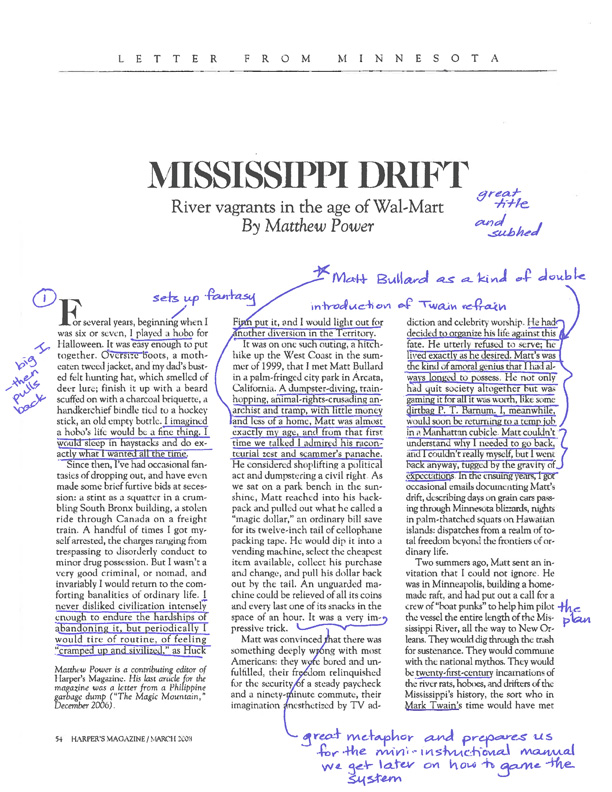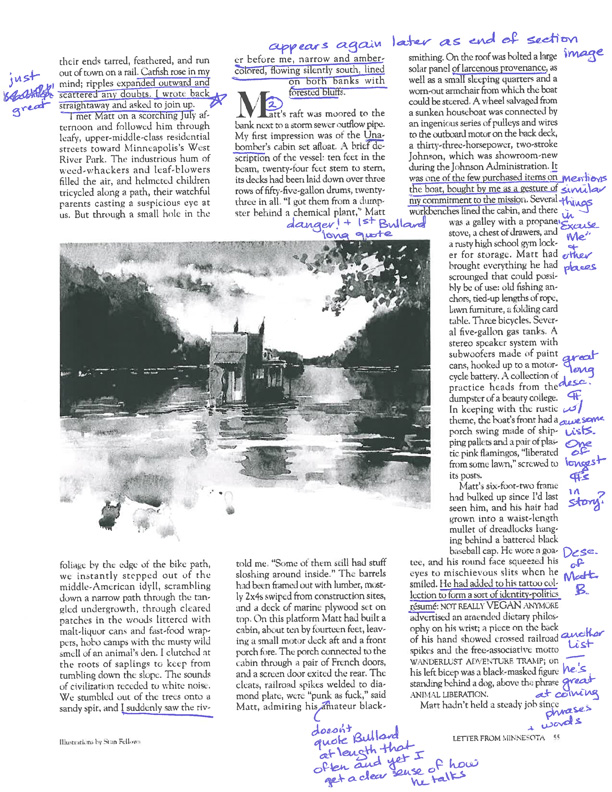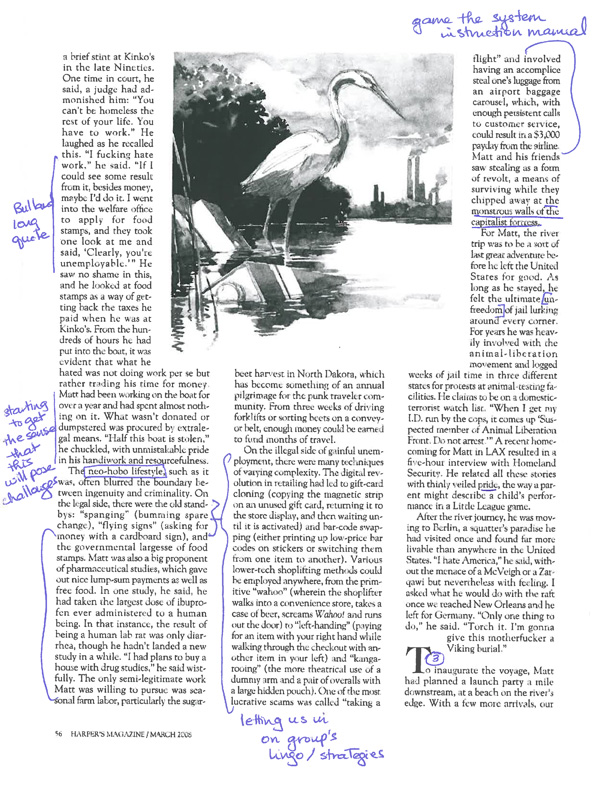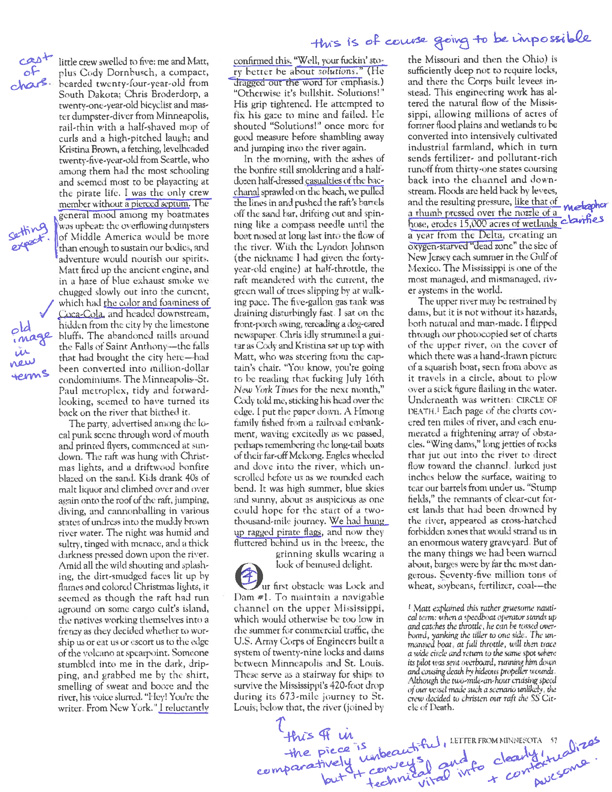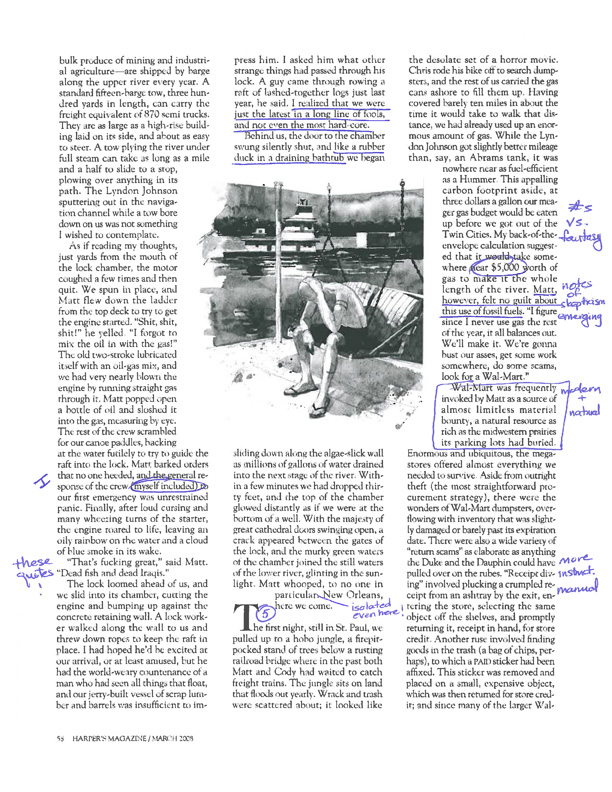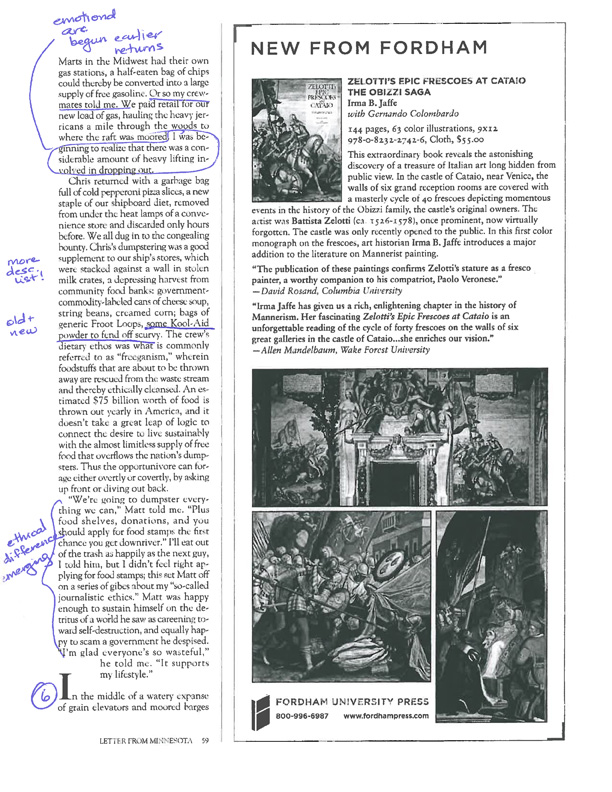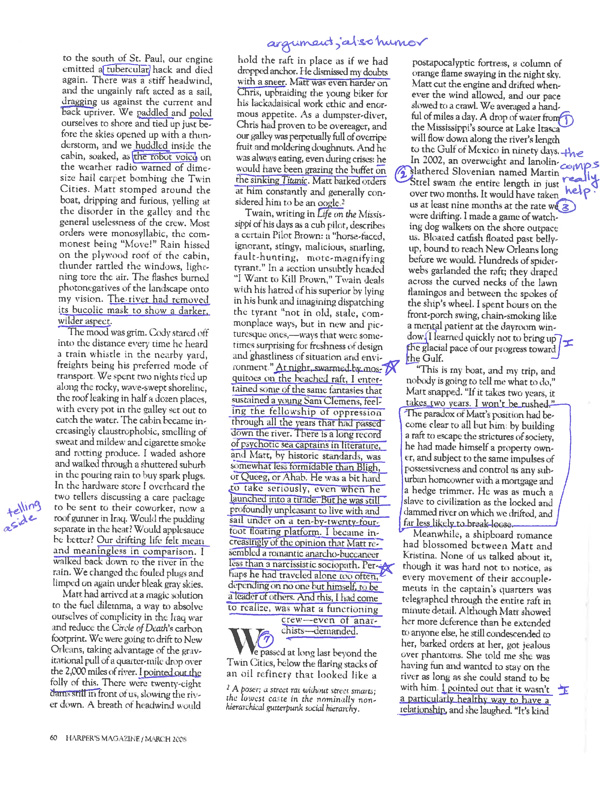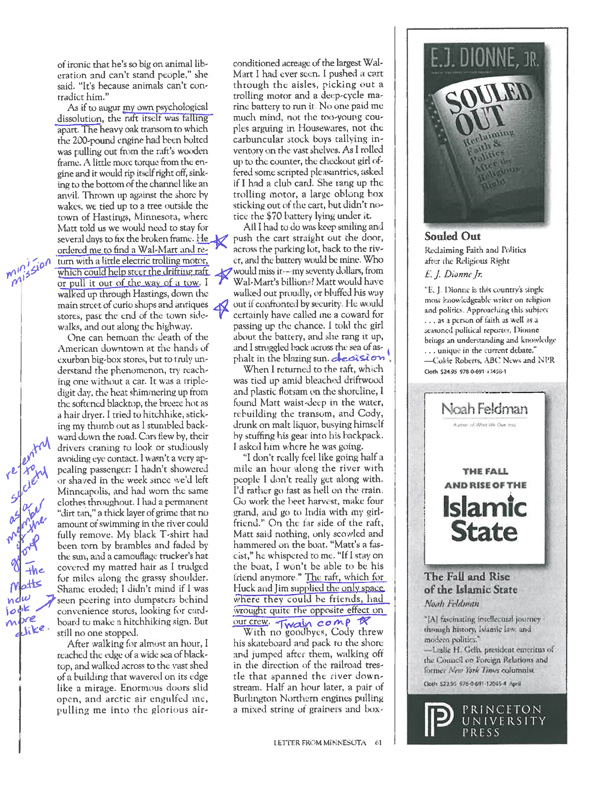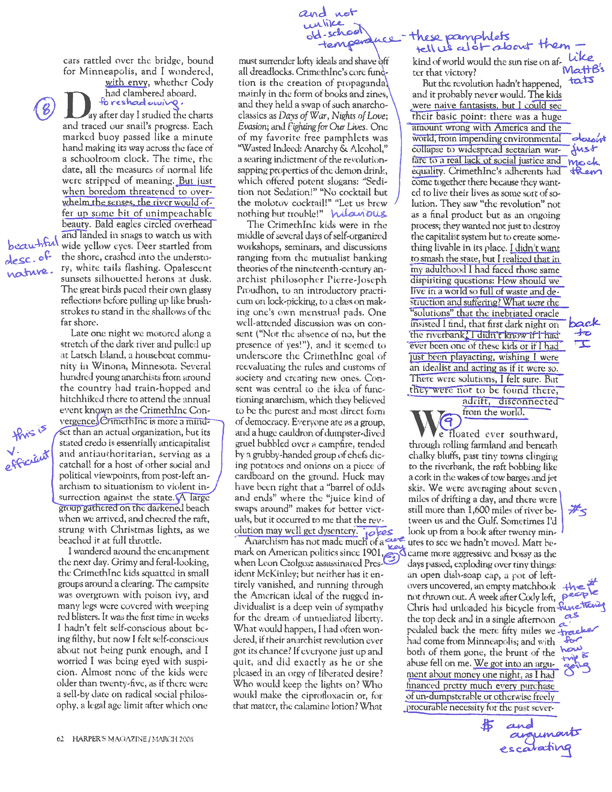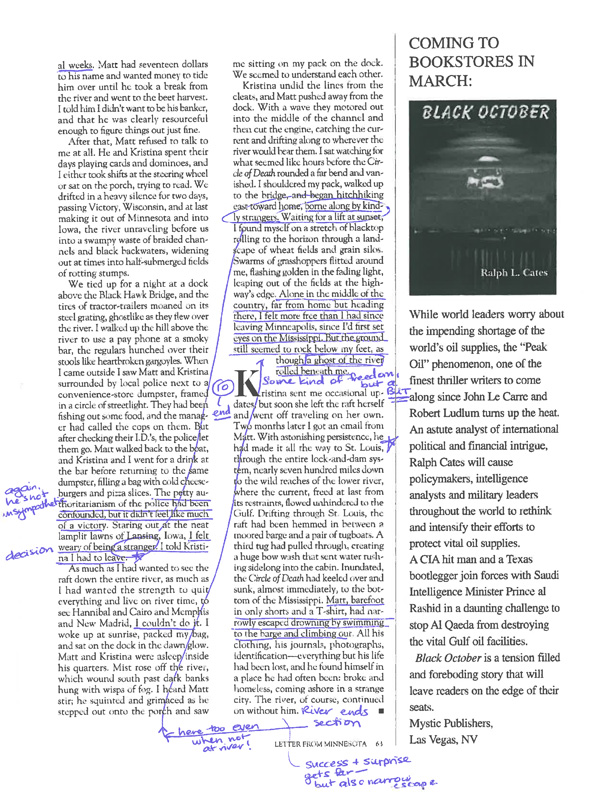My friend Matthew Power, wondrously excellent human and magazine journalist, died recently while on assignment in Uganda.
Like so many others, in recent days I have missed Matt, older-writing-brother Matt, in part by revisiting his work. I have been reading his old print stories, and discovering his radio archives. He had a slightly scratchy voice so irrepressibly warm it almost belongs on vinyl. His voice on the page is like that too.
I became friends with Matt and his wife, the brilliant journalist Jess Benko, during the year they lived in Ann Arbor, Mich.; we were introduced by mutual pals, including Donovan Hohn. Matt was a Knight-Wallace Fellow at the University of Michigan, where I teach creative writing. I had moved to Ann Arbor from New York one year before they did. When they arrived, they were a powerful reminder of a world I still loved and had half left. I was no longer primarily a journalist; I was no longer exactly a New Yorker. I missed journalists, but I thought of myself as a guest in that conversation. Matt and Jess, however, were masterful and nonchalant flatteners of impostor syndrome; they simply paid it no mind. We talked about reporting and writing and politics and people and the news all year long. We stayed in touch after they returned to New York, and when I visited, I often saw one or both of them.
At the time that Matt died, he and I had (each unbeknownst to the other) promised Storyboard that we’d write for the “Why’s this so good?” series. Now I am writing about his 2008 Harper’s piece “Mississippi Drift,” which I love, and which I have never read without considering its author a friend.
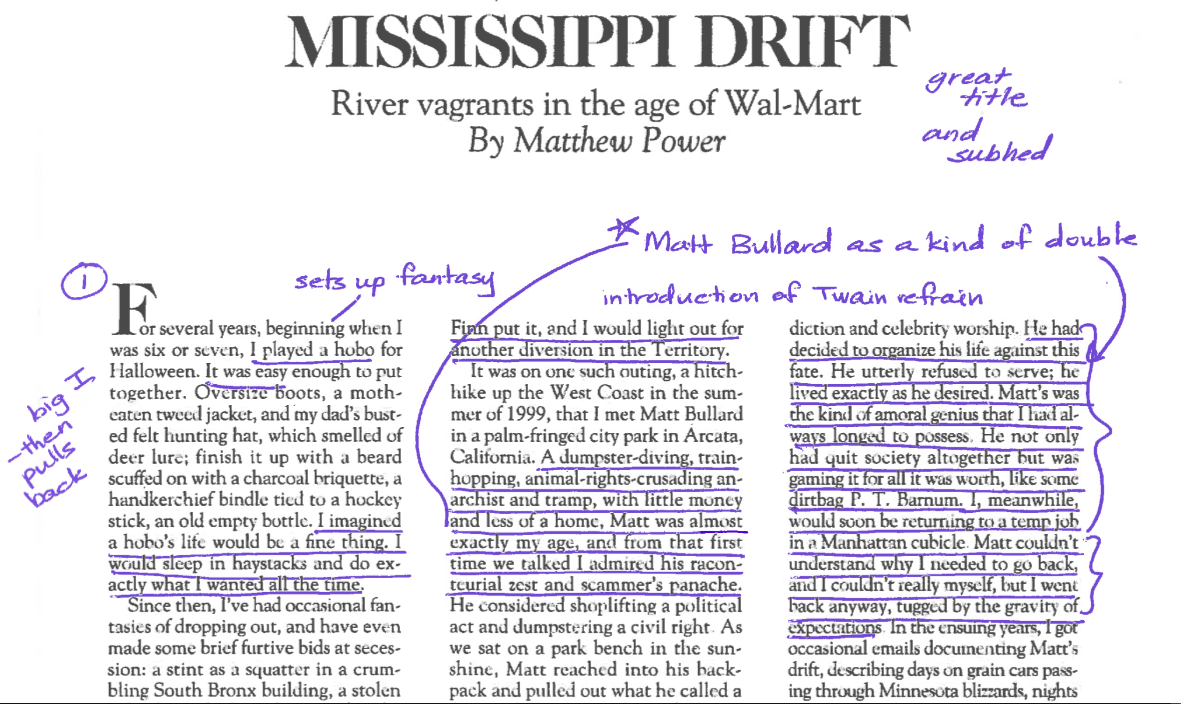
For V.V. Ganeshananthan’s hand-annotated copy of “Mississippi Drift,” published here with the permission of Harper’s, see the images at the end of this essay.
In recent years, much of my media criticism has been directed at travel stories, which are so often ludicrously devoid of other people. I think it’s unprincipled to write about places as though people don’t live in them — literary colonialism trying to cover up journalism’s need for advertising. The kind of travel writing Matt did, on the other hand, I adored and adore, because it was crammed not just with place or price or beautiful description, but with character. Travel with some writers is an escape from other people: With Matt, it was a search for them. And this, perhaps, is what “Mississippi Drift” is about, one of the main reasons it’s so good. The piece, a 10-page stunner, is canonical Matt for good reason. I’ll pick out just a few.
On personified/metaphorical river and structure:
This gorgeous and textured piece of writing is about Matt Power joining an old acquaintance, anarchist Matt Bullard, in his quest to travel the length of the Mississippi in a “jerry-built vessel.” Sometimes a piece jumps all over the place and does so beautifully — but this doesn’t need to. A trip has its own structure — starting point; terminus — and Matt is a canny dealer in detail. We can follow his voyage by charting its progress against the map and plan he lays out early on; we can watch crew members decide to leave; we can measure the ideas — how much did Bullard think something would cost? — against what Matt says it did, or could.
Many of the sections end with river imagery. There are some great descriptions of the natural world here — Matt isn’t afraid to reach for poetry. But there’s more going on than just simple description. If you watch these river images across the course of the piece, you can see how they chart the emotional progress of the trip. It’s subtle but effective.
The first water imagery in the story is, tellingly, in Matt’s head: “Catfish rose in my mind: ripples expanded outward and scattered any doubts. I wrote back straight away and asked to join up.” (That last sentence in particular seems utterly characteristic of his approach to things.)
On the long beginning and the other Matt:

Matt Power (photo by Amber Hunt)
Notably, the boat doesn’t budge from its launch point in Minneapolis until page three of 10. But the long beginning sets up an enormous amount, and invites us into Matt’s childhood fantasy of being a hobo. If the “plot” of the story is will they get from point A to point B together? the emotional arc of the story is about puncturing that fantasy. He sets up so much here that pays off later: the Mark Twain/Huck Finn references that become a refrain, and the descriptions of the river.
And he begins with himself. He builds a version of himself strong and clear enough to recede a little bit later on the boat, when Bullard takes center stage. Much has already been said about Matt’s love of travel, and his acknowledgment of his own presence in his stories. In this story, however, he accomplishes something even more interesting — he almost makes himself a character twice. In Matt Bullard, in part through the sheer coincidence of a shared name, Matt Power has a double for himself, someone who is “almost exactly my age,” and whom he admires. In fact, early on in the story, Matt Power basically cops to the fact that he aspires to be Matt Bullard:
He utterly refused to serve; he lived exactly as he desired. Matt’s was the kind of amoral genius that I had always longed to possess. He not only had quit society altogether but was gaming it for all it was worth, like some dirtbag P.T. Barnum. I, meanwhile, would soon be returning to a temp job in a Manhattan cubicle. Matt couldn’t understand why I needed to go back, and I couldn’t really myself, but I went back anyway, tugged by the gravity of expectations.
One gets the curious sensation that Matt is Matt is Matt is Matt is Matt, especially in that last sentence. Two Matts may diverge on a wobbly raft! And indeed, they do.
Both Matts imagine the life of a drifter to be something romantic and exciting, and when it isn’t, they have very different reactions. It’s worth noting that Matt Power doesn’t quote Matt Bullard directly that often, but when he does, Bullard is saying something that gives me a real sense of how he talks. “Punk as fuck,” for example. Matt’s judgments of Matt are something to follow as they evolve over the course of the trip.
On descriptions, humor, coining words, contrasts, kindness:
Matt Power’s references in this story range from the Unabomber to Twain; he is extremely well read and it shows (but not in a smug way). There are also fantastic and deeply characterizing descriptions, many of which are lists of very specific objects.
Matt also makes the most of the friction between past and present, between fantasy and reality, between idealism and pragmatism. This produces laughs, but not especially mean ones. He has a gift for coining and combining words when the ones that already exist won’t do. Much of the pleasure in the piece comes from the tension between the fantasies of an earlier era and present realities:
“identity-politics resume” (referring to Bullard’s tattoos)
“Kool-Aid powder to fend off scurvy”
“neo-hobo”
“the revolution may well get dysentery”
And yet Matt doesn’t scoff at the young anarchists he meets:
“The kids were naïve fantasists, but I could see their basic point: there was a huge amount wrong with America. … They saw ‘the revolution’ not as a final product but as an ongoing process; they wanted not just to destroy the capitalist system but to create something livable in its place. … There were solutions, I felt sure. But they were not to be found there, adrift, disconnected from the world.”
On his own presence, numbers and technical information:

V.V. Ganeshananthan
To read Matt is to travel with Matt — not behind him, but beside him. It’s a nice alignment. His writing is so good in part because of the credit he gives his readers: He expects them to deal with a messy world, and renders it with a deep precision. You can see in the prose that Matt wrote about worlds in which he considered himself culpable (when he writes of an early panic on the raft, he describes it and then annotates to make sure we see he’s part of it). When his participation in these journeys prompts financial involvement, he tells us that too.
He is also willing to take on space and people and science and nature and politics. He is by turns brutally efficient and gorgeously poetic; he is a master of sharing lingo and offering up expertise. (For example, the piece offers, at various points, instructions for “gaming the system,” but does this without endorsing that approach.) I wrote earlier about the river imagery — and that is impressive. But the paragraph, on Page 57, about how engineering locks and levees has affected the river and the surrounding lands strikes me as maybe even harder to pull off: He has distilled into a paragraph a huge sense of how the Mississippi actually works (or doesn’t).
On decisions:
The version of himself that Matt built in the story’s early pages emerges with clearer and clearer judgments as the story progresses, and finally, makes two decisions that feel key to my caring about the story. (Following, of course, the initial great decision to accept Bullard’s invitation.)
The first occurs in a Wal-Mart, when partway through the trip Matt Bullard orders Matt Power to acquire a needed part from the superstore (“a natural resource as rich as the Midwestern prairies its parking lots had buried”). The scene is a mini-mission that presents a smaller version of a big question: Can Power sign on to Bullard’s way of doing things? The answer is no:
Matt would have walked out proudly, or bluffed his way out if confronted by security. He would certainly have called me a coward for passing up the chance. I told the girl about the battery, and she rang it up, and I struggled back across the sea of asphalt in the blazing sun.
The second leads us to the end: Matt decides (after two others have already done so) to leave the raft. He and Bullard have fought and aren’t speaking; his feelings are finally plain. “I felt weary of being a stranger,” he writes. He wants other people, and finds them almost immediately, as hitchhiking he’s “borne along by kindly strangers.”
And yet, standing in a setting of fields and silos, waiting for his next ride, he feels “a ghost of the river” beneath him. Just as the fantasy of the river preceded the beginning of the trip, it’s following him out.
The decisions are hinges in the story: We get to see him wonder and choose. A remarkable passage, which seems part of the decision to leave the raft and reconnect with society:
At night, swarmed by mosquitoes on the beached raft, I entertained some of the same fantasies that sustained a young Sam Clemens, feeling the fellowship of oppression through all the years that had passed down the river. There is a long record of psychotic sea captains in literature, and Matt, by historic standards, was somewhat less formidable than Bligh, or Queequeg, or Ahab. He was a bit hard to take seriously, even when he launched into a tirade. But he was still profoundly unpleasant to live with and sail under on a ten-by-twenty-four-foot floating platform. I became increasingly of the opinion that Matt resembled a romantic anarcho-buccaneer less than a narcissistic sociopath. Perhaps he had traveled alone too often, depending on no one but himself, to be a leader of others. And this, I had come to realize, was what a functioning crew—even of anarchists—demanded.
(Emphasis mine.)
On the ending:
Like all good endings, this one offers a bit of a surprise: Alone, Bullard gets farther than Matt thought he would, “all the way to St. Louis.” But ultimately, Bullard nearly drowns, and loses all of his possessions. “The river, of course, continued on without him,” Matt writes. It’s a perfect way to end a story about a trip and a search that goes on — for a way to live with other people in a flawed but beautiful world.
V.V. Ganeshananthan is a fiction writer and journalist. She is the author of a novel, Love Marriage (Random House, 2008), and teaches in the Helen Zell Writers’ Program at the University of Michigan. @vasugi



